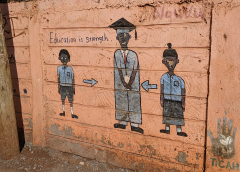
NC State College of Education Faculty Engage in Outreach, Professional Development Through International Travel This Summer
[ad_1]
When the COVID-19 pandemic hit in 2020, many faculty and students in the NC State College of Education had to cancel or postpone their plans for international travel. With restrictions easing this summer, several faculty members had the opportunity to resume travel, visiting parts of Europe and Africa to engage in professional development, help in-service teachers develop new skills and establish new international partnerships.
Read a selection of these stories below:
Associate Professor Michelle Falter Provides Professional Development for Dozens of Kenyan Teachers on 3rd Trip to Country
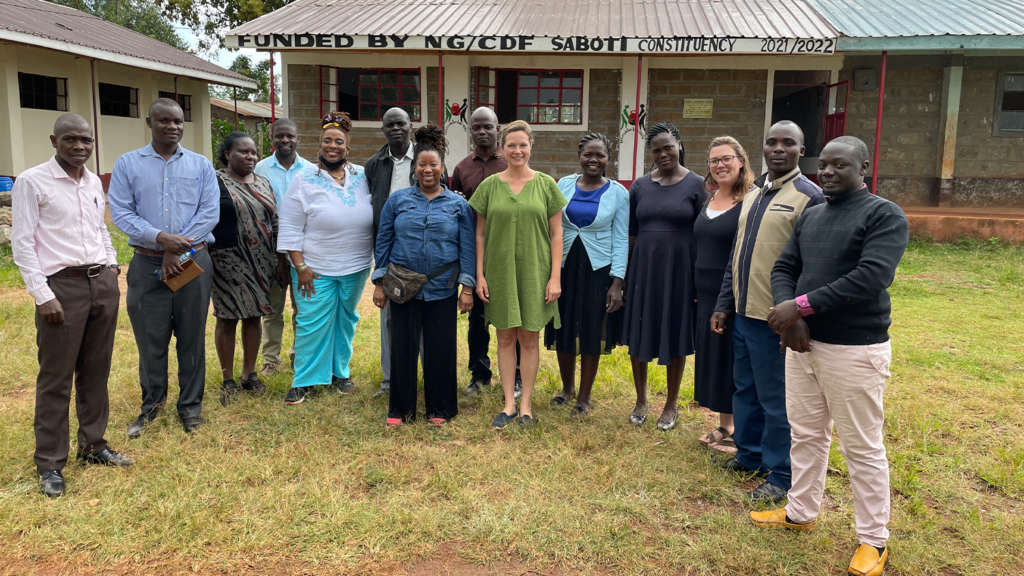
When NC State College of Education Associate Professor Michelle Falter made her first trip to Kenya in 2018, many of the teachers there were learning to use a computer for the first time. When she returned this year, the teachers were interested in learning as much as they could about technology and digital tools.
On a trip led by College of Education alumna Shea Kerkhoff ‘16PHD, Falter and other professors from around the country conducted professional development for around 70 teachers from 15 different schools in the rural Trans-Nzoia region of Kenya. This is the third time Falter and Kerkhoff have returned to the region to provide professional development for teachers, although the COVID-19 pandemic forced them to take a two-year hiatus from what was originally intended to be an annual trip.
This year, professional development related to technology focused on digital citizenship, including ways for teachers and their students to consider privacy and security as they engage in digital spaces, including thinking about what they are sharing, getting permission to post other people’s photos and cyberbullying.
“The challenge with professional development around digital tools is that they don’t always have the technology to practice it, so it often becomes a bit abstract. We have to really think very carefully about how to teach them some new things but also make sure that they’re able to then take it back and actually do something with it,” Falter said. “Most Kenyans have cell phones, so they are using the internet, and they have social media.”
Professional development in the past has also focused on helping Kenyan teachers engage in student-centered practices, which Falter said has become even more important as the country adopts a new curriculum that is more closely aligned with the American model of education and pushes teachers to engage in learning-centered strategies.
Implementing these practices, Falter said, can be difficult in Kenyan classrooms, where teachers are often in charge of more than 60 students at a time and have limited resources to engage students in projects.
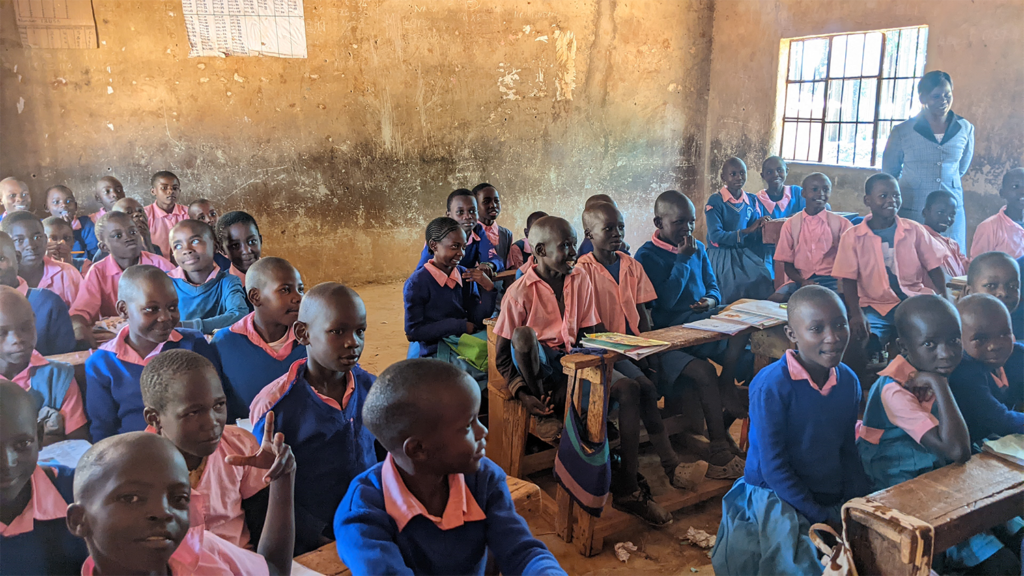
To help teachers through this transition, the group shared learning-centered strategies that do not require a lot of resources, including using Visible Thinking practices—which integrate student thinking with content learning—such as the “Think-Pair-Share” or “Hexagonal Thinking” strategies in which students work together to solve a problem or answer a question.
Falter and Kerkhoff shared a total of seven strategies, which were selected because they could be incorporated in any grade level or content area. Teachers then got to practice the strategies and brainstorm ways they could be used in the new curriculum.
“All of the teachers were super excited about it, and it was great. One of the things I love about Kenyan teachers is that they’re so open to learning new ideas,” Falter said. “Like with most educators, the struggles of implementing these strategies are always in the back of their minds, so we were helping to push back and get them to think, ‘I can do this, I just have to adapt and modify.’”
Falter and Kerkhoff also engaged in research while in Kenya, observing more than 40 hours of instruction across different grade levels and courses to study to what extent Kenyan teachers are applying student-centered practices in their classrooms.
Although the switch from teacher-centered to student-centered practices is still in progress, Falter noted that the teachers she observed excelled in using song and dance to engage students in a way that is not used in the United States.
“Part of that comes from a long history of oral tradition and passing on ideas through that way, but they use it in such fun ways that are very engaging in the classroom and that was really fun to see,” she said.
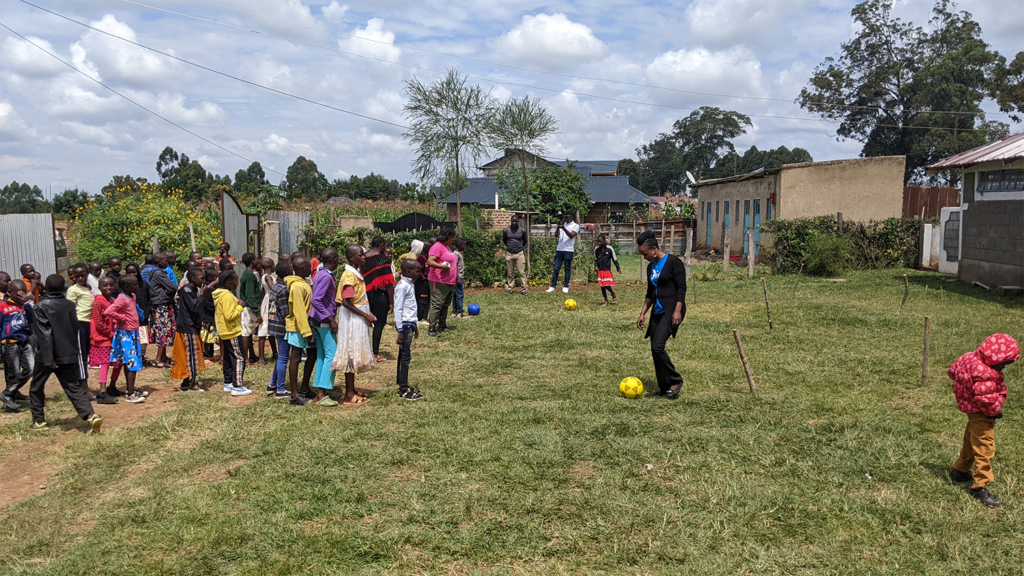
In addition to working with and observing educators, Falter also had an opportunity to work closely with children by organizing a day camp at a local church run by Bishop Peter Wanyonyi for community children of all ages. More than 500 children participated in activities including sports, arts and crafts, literacy activities and social emotional learning.
The day was one, Falter said, that was especially important for the children, who often spend their free time working alongside their parents and whose access to fun outside their homes has been severely limited over the past two years because of the pandemic.
“On the weekends, kids usually help their parents with work, with farming, and they go to church. It’s not free social time like in the United States. Having access to things like crayons and books that are just fun, and playing sports with actual soccer balls, this is a really big deal for them,” she said. “We laughed all day and had so much fun.”
After a 2-year Wait, NC Teachers Travel to Germany On Cultural Immersion Trip Led By Professor, Department Head Kevin Oliver and Associate Professor Angela Wiseman
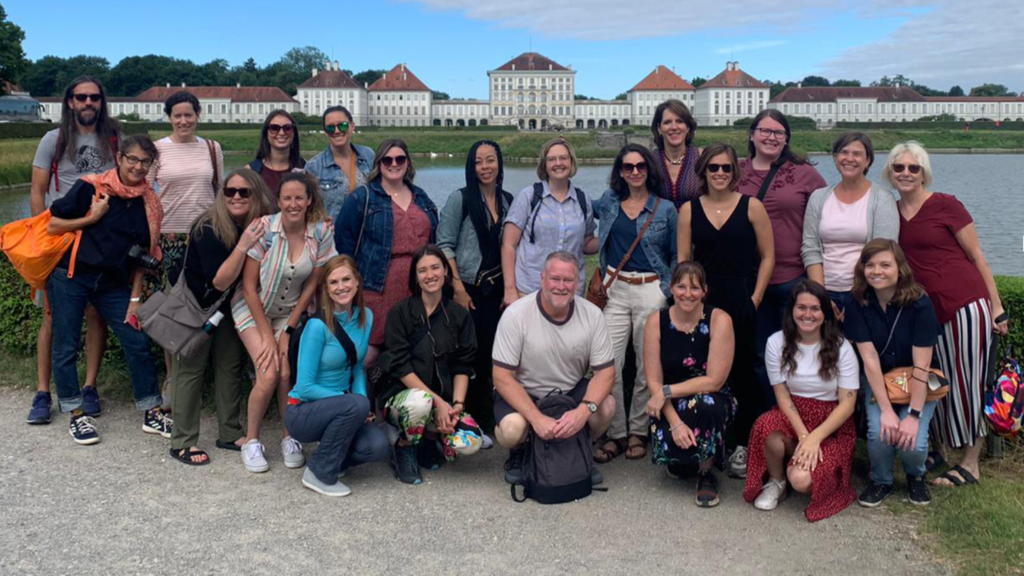
When teachers signed up in 2019 for a cultural immersion trip with NC State College of Education Professor and Department of Teacher Education and Learning Sciences Head Kevin Oliver and Associate Professor Angela Wiseman, nobody imagined it would take more than two years for the trip to become reality.
The trip to Germany for more than a dozen in-service educators from Wake, Orange, Durham and Chatham counties was originally planned for the summer of 2020 as part of the Cultural Investigation and Digital Representation for Educators (CIDRE) program. However, the onset of the COVID-19 pandemic meant that the trip had to be postponed until 2022.
“It was fabulous to be able to travel with the teachers,” Wiseman said. “Teachers have been through so much in the past two years that they were excited and so appreciative to be together and experience new adventures. The energy and camaraderie were palpable.”
Started in 2011, CIDRE infuses writing and technology into different cultural experiences and has provided 145 teachers with opportunities to travel to countries like England, Finland, Sweden and the Czech Republic.
Prior to traveling, teachers met for three full-day classes on NC State’s campus where they learned to use various tools and approaches for representing cultural information. These included augmented and virtual reality technology, maps, documentaries and games.
In the past, teachers then completed the same set of digital projects. This year, each educator selected a cultural theme related to Germany that they were interested in studying while in the country and selected the digital approaches that could best represent their particular theme.
“By training teachers to represent cultural themes with digital tools, we aim to equip them with the skills and comfort level to likewise engage their increasingly diverse student bodies in activities that are culturally-reflective and help to broaden cultural exposure and understanding,” Oliver said. “The benefactor of our grant [that funds the program], Frank Borchardt, was a professor of German language at Duke University who was an early innovator with educational technology. He held that teachers have a platform from which to open students’ minds to diverse cultures and tolerance for difference.”
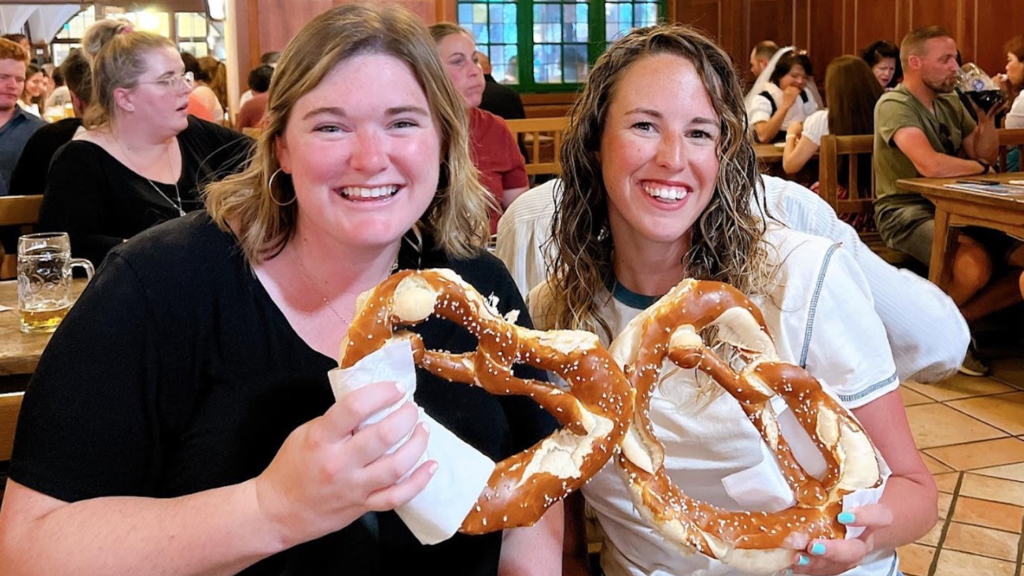
While in Germany, the teachers visited several sites as a group, including two documentation centers in Munich and Nuremberg that shared the story of German nationalism and Nazism in the 1930s through 1940s and the Dachau concentration camp, where they received a private tour with a German historian who helped connect these past events to modern global issues related to nationalism and immigration.
“Social studies teachers participating in the program were particularly interested in visiting these sites to better understand and teach these topics to students as part of classes like world history,” Oliver said.
Teachers had a private tour of the International Youth Library—at which Wiseman served as a research fellow in 2015—where they learned about resources and programming for young children in Germany. Teachers were also able to conduct research in the library, which has the largest collection of international children’s literature in the world. Additionally, the group visited several cultural sites in Munich and Bavaria, which helped convey the story of the country’s historical royals, as well as more contemporary sites, like the BMW Museum, where they learned about design, engineering and corporate responsibility campaigns.
Each participating teacher was also given a five-day Munich pass that allowed them to visit local museums, where they completed visual thinking protocols to elicit thinking about German culture, and had the opportunity to further explore their selected cultural themes.
“It was really amazing to see how the teachers incorporated digital technology and global perspectives into their curriculum. One of my favorite, and completely unexpected, examples was that a kindergarten teacher designed a video game that incorporated elements of German fairytales,” Wiseman said. “One of the most exciting aspects of this program is that the teachers come with so many ideas for how they might incorporate cultural perspectives into their curriculum that we cannot even anticipate the creativity and insight.”
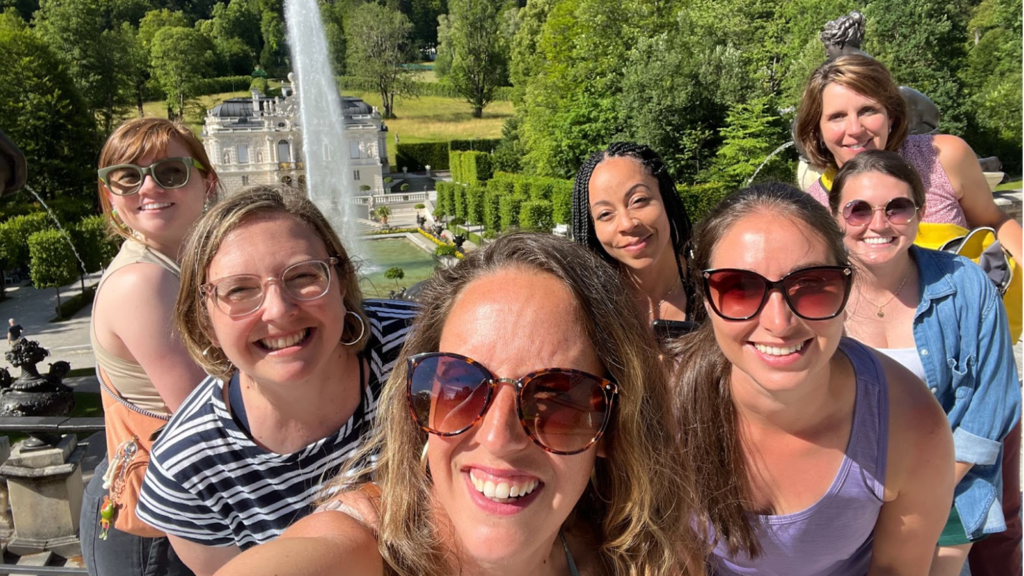
Oliver, Wiseman and the teachers returned to the United States in early August, but the group plans to meet one more time in September, when the program will formally wrap-up and teachers will have the opportunity to showcase the projects and follow-on they created as a result of the experience.
Associate Professor Cameron Denson Continues to Enhance STEM Learning on Return Trip to Botswana
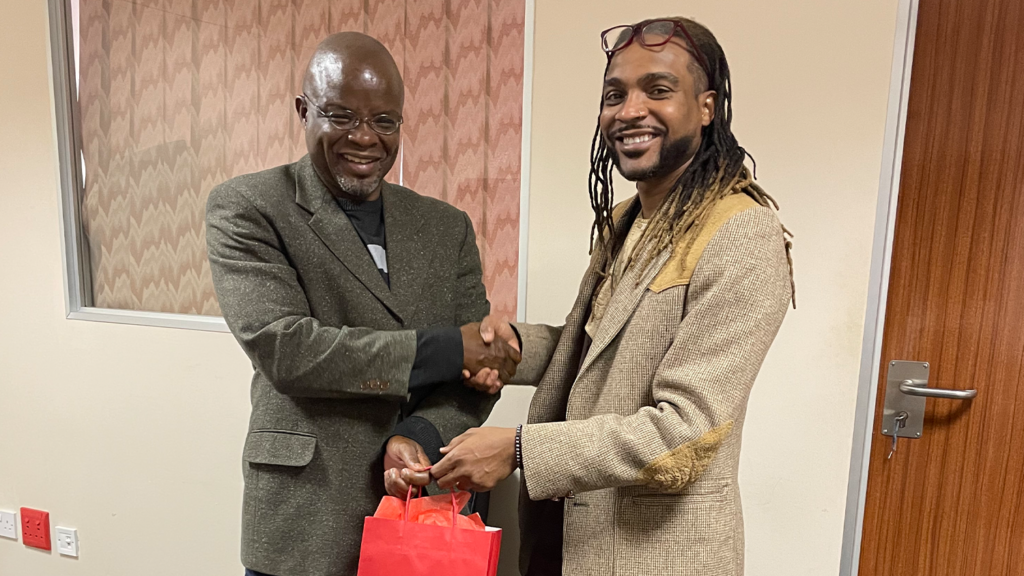
Cameron Denson, an associate professor in the NC State College of Education, is expanding access to STEM education through a developing partnership with students and educators in Botswana.
Denson first visited Botswana back in 2019 as part of a National Guard-sponsored trip that invited representatives from North Carolina to collaborate with the country’s leaders to help share insight about STEM education in an effort to reimagine the local economy.
On his return trip this summer with Postdoctoral Research Associate Gary Wright ’22PHD, Denson created a memorandum of understanding with the Botswana International University of Science and Technology (BIUST) to commit to the facilitation of the new Augmented Botswana Learning Experience (ABLE) project.
ABLE is a proposed co-learning experience between underclassmen STEM majors at BIUST and upperclassmen STEM majors at NC State who display exceptional skills in graphic communication. The proposed six-week curriculum will allow NC State and BIUST students to engage in an engineering design project to address a technological issue local to Botswana.
“BIUST students will work with their NC State consultant to redesign and modify a technological innovation to meet the designated challenge,” Denson explained.
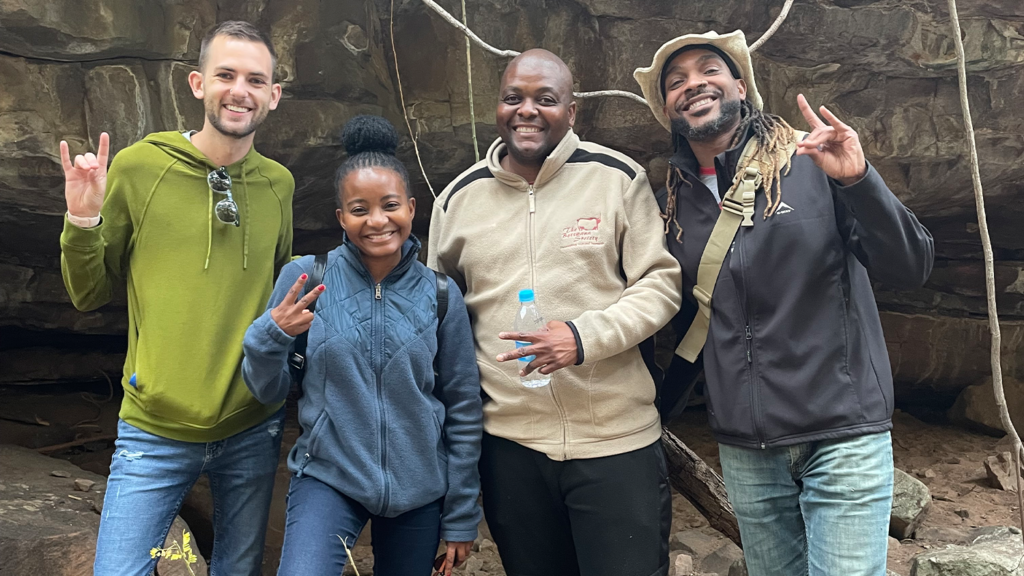
One of the other goals of Denson’s two week trip to Botswana was to roll out an e-STEM mentoring program similar to one he has developed and used in the United States.
With funding from the National Science Foundation, Denson developed the “STEM Squad” app, which was piloted in Spring 2021 by matching students in the North Carolina Math/Science Education Network (NC-MSEN) Pre-College Program and STEM majors at NC State for a 16-week mentorship program.
Support provided by NC State students helped the younger participants develop their STEM identities by looking at different representations of people who are historically underrepresented in STEM careers and helping students think about the educational journey ahead of them as they pursue a STEM degree. The mentors and mentees also discussed non-academic factors related to pursuing STEM, including feelings of isolation that result when they are the only person of color in their class and groups that can help them acclimate to the college experience.
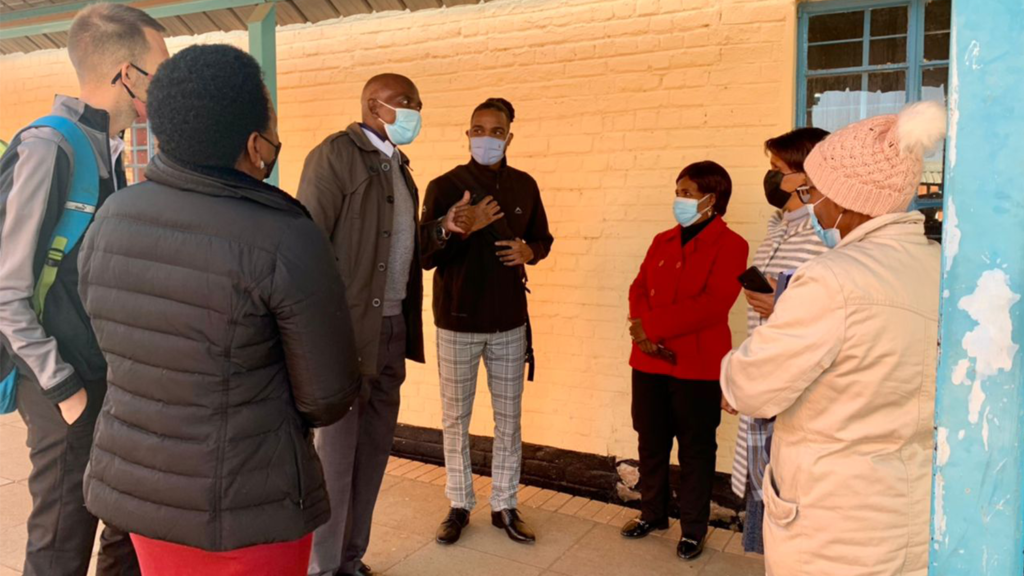
To adapt the e-mentoring program for Botswana, Denson created eight pairs of mentors and mentees whom he met with while visiting the country this summer. The intention is for the program to operate in Botswana in the same way as it did in the United States, with the exception of the fact that participants will communicate through WhatsApp instead of the STEM Squad app because of technical issues that arose for some users.
Although Denson has set the stage for these two projects to move forward in Botswana, he acknowledges that there is more work to be done in collaboration with scholars in the country to improve STEM learning. As his original plan to spend a semester abroad was cut short to two weeks as a result of the COVID-19 pandemic, he hopes to ultimately secure more funding to return and continue to build this international relationship.
“The people, land and culture of Botswana are something to behold. However, two weeks is not a semester and there is an opportunity lost when seeking to establish international partnerships,” he said.
[ad_2]
Source link


